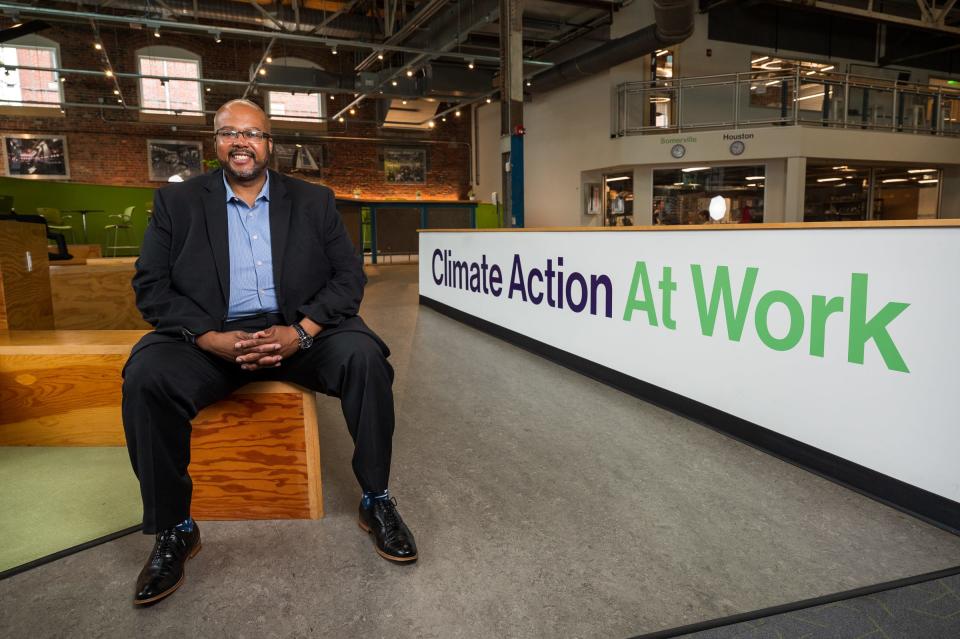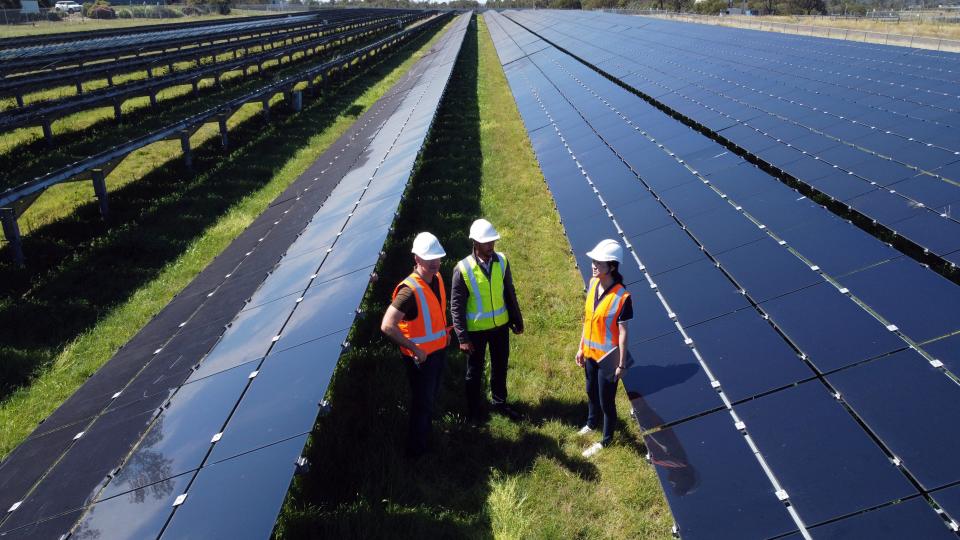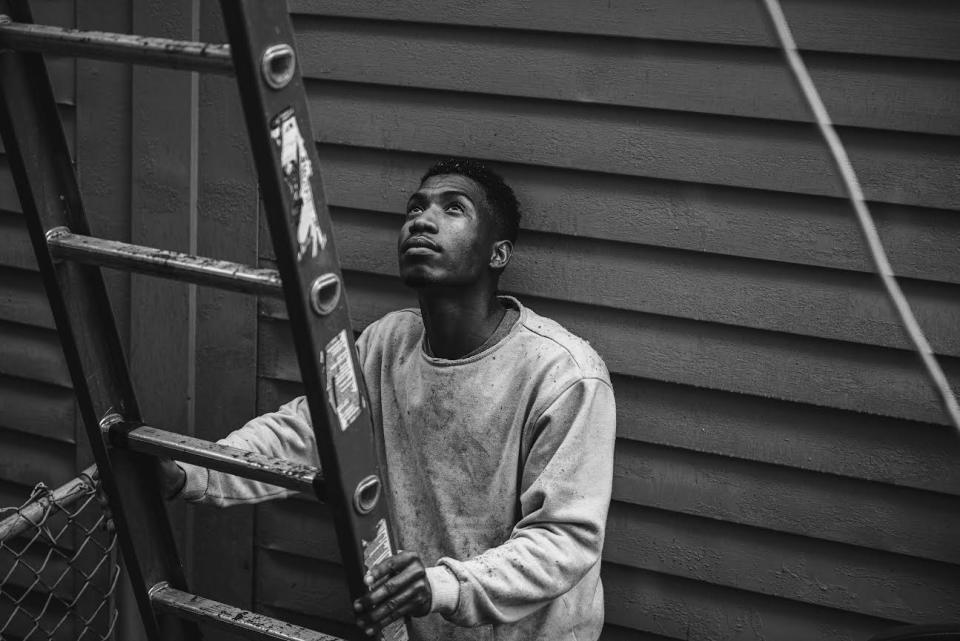Meet the groups bringing people of color into New England's energy industry
The color of New England's clean energy landscape is starting to crystalize, and it's not green.
It's white.
A chance to build an industry from the ground up, an equitable and just sector that works to correct wrongs of the past, provides a landmark opportunity. But the energy transition is on the move, and many worry history is about to repeat itself.
People of color are vastly underrepresented in the industry.
"My biggest concern is, are we going to be left out again?" said Kerry Bowie, executive director of Browning the Green Space.

An inclusive industry that empowers the very populations most historically harmed by climate change, pollution and corporations won't rise on its own, and people like Bowie know that. They're taking action, and not waiting around to see how it plays out.
"You have to be intentionally inclusive and bringing people into the fold," he said.
The name of Bowie's nonprofit quite literally summarizes its mission — a cross sector group of leaders working to bring more people of color into New England's energy field. The group works out of Greentown Labs in Somerville, Massachusetts, a climate tech startup incubator.
For Bowie, the new industry is about "creating jobs, building wealth and reducing the energy burden" for communities of color. Black, brown, Latinx, Indigenous and low-income people have historically been subjected to toxic dump sites, polluted air and water, and heat islands — and the associated poor health outcomes.

So far, data shows people of color aren't getting their fair share of jobs in the energy industry. A 2021 report looking at diversity in the national clean energy industry
found about 61% of clean energy workers across the country were white non-Hispanics, with Black and Hispanic/Latino workers more poorly represented in clean energy than they are in the rest of the economy.
"It's very similar to what happened during the Industrial Revolution when we built up jobs and environmental justice communities were left behind," said Ruth Georges, supervisor of equity, strategic partnerships and workforce development at Eversource.
Offshore wind: Will Massachusetts be ready with the workforce needed?
As New England taps into the potential of wind, solar and energy efficiency, and utility companies are tasked with charting a greener future, a choir of diverse voices are calling for more seats at the table, and an intentional movement to see that through. There will be thousands of new jobs — both blue and white collar.

Joining the fight is the American Association of Blacks in Energy Greater Boston Chapter, a group fostering community and a talent pool in New England. Its president, Shalaya Morissette, is lead process manager of pipeline safety and compliance at Rhode Island Energy, which was National Grid until a recent acquisition.
"You're going to have the poorest people suffering from the decisions of large companies," said Morissette. "I'm the person that says, 'Let me make sure you're well represented in these spaces.' I am a Black person, I am a woman, I am a mom. All of those facets of me are coming into play to represent a really diverse group in the energy space."
'These are good jobs:' Why is diversity important in clean energy?
States in New England are leading the way in the move to clean energy.
Massachusetts enacted first-in-the-nation climate legislation last year, setting strict emissions goals for 2030 and 2050. With offshore wind potential, the state has a "goldmine" off its coast, Bowie said.
Rhode Island last month marked another first — a law requiring all of the state’s electricity be offset by renewable energy by 2033.
Aggressive action: RI now has nation's boldest renewable energy law. Here's what it does, and doesn't, do
Vermont has the largest share of in-state electricity net generation from renewable resources of any state, according to the U.S. Energy Administration.
Benefits to reap from the emerging industry are many, and organizations across New England are using workforce development, youth engagement, paid internship and training programs, and networking to ensure diverse populations get a piece of the pie.
"These are good jobs," said Bowie, "and people can stay in their communities. Wind, retrofitting, solar, heat pumps, insulating. That work is right on top of us now."

Take Vineyard Wind, the nation's first utility-scale wind farm being constructed 12 miles south of Martha’s Vineyard. An analysis by the former UMass Dartmouth Public Policy Center found 1,706 to 2,120 workers would be employed during the first phase of planning, construction, operations and maintenance, with an average annual wage between $77,671 and $85,021.
The industry could be an economic boon for a blue-collar community like New Bedford, which will have several key sites for offshore wind development.
Seeing is believing: New Bedford walking tour shows where offshore wind jobs will be
Bowie's career in environmental engineering has featured stints in the administrations of governors Deval Patrick and Charlie Baker. When he worked in places like New Bedford, Brockton, Fall River, Worcester, Lowell and Springfield, he got wide-eyed looks when talking about climate change or energy efficiency.
To residents of those cities, "environmental things were luxuries," he said. They were focused on better jobs, housing, education and transportation.
Utility costs: New England predicted to see nation's highest wholesale electricity prices this summer
"What I was seeing was, how can we get more than our share of the bad stuff, and to add insult to injury, miss out on our fair share of the good stuff?" said Bowie.
A coalition called Climate Jobs Rhode Island, for example, is explicitly pushing
state government and union apprentice programs to prioritize hiring people of color and individuals from local communities in all clean energy work.

Rouwenna Altemose, co-founder of All In Energy, a Massachusetts nonprofit connecting underserved communities to energy-saving programs, said many marginalized populations fear anything related to energy, as they've historically been targeted by scams and disproportionately harmed by third party energy suppliers.
Part of the problem, said Altemose, is they don't see themselves in the industry.
"Walk into any clean energy company and chances are you're going to see a lack of women, people of color and multilingual individuals," she said.
The lack of diversity has ripple effects. Entire communities are missing out on energy efficiency because contractors and auditors don't speak their language. At the decision-making tables, lived experiences are lacking.

In that sense, the goal Bowie, Altemose and others are working towards is two-fold. People of color employed in the energy industry are able to bring their communities along with them.
"It's community development," said Bowie. "If there are contractors who are people of color who speak Spanish or Haitian Creole, they're probably going to hire more Latinx or Haitian folks. And that's going to translate to more uptake in those neighborhoods of energy efficiency."
Paid internships, mentorship key for diversifying energy industry
A workforce development needs assessment
commissioned by Massachusetts' utility companies pointed to several reasons why the industry looks like it does.
The study found few employers had formal diversity initiatives or mentorship programs, and many relied on word-of-mouth recruitment for hiring, worsening the workforce inequities.
Meanwhile, the findings also highlighted industry positives that people of color are missing out on: high levels of job satisfaction and "numerous employment benefits and career advancement opportunities within the industry."

Through its Mass Save collaborative, utility companies Berkshire Gas, Cape Light Compact, Eversource, Liberty Utilities, National Grid and Unitil formed a Clean Energy Pathways program, offering three-month paid internships to people of color, women, LGBTQ+, first-generation residents, and/or multilingual speakers, teaching them skills in heating, ventilation, air-conditioning and weatherization.
The program focuses on people from Dorchester, Fall River, Lawrence, Mattapan, Roxbury, Springfield and Worcester — all state-designated environmental justice communities.
Internship pay starts at $20 an hour, and the goal is to be hired full-time.
"Think about the marginalized populations we're trying to reach," said Georges, who coordinates the program through her position at Eversource. "That is something that could financially put them in a whole different situation in life."

That's what Clean Energy Pathways did for Stevenson Elianor, an immigrant from Haiti who came to the Boston area in the 10th grade and didn't speak any English. It was a struggle, he said, and after high school, he started working at a retail store.
"Getting into that program and getting a job through them helped a lot," said Elianor, who now lives in Weymouth and works for an insulation company. He recently got promoted, too.

Asked what he likes about his job, Elianor said he's "saving the environment" and making good money.
"I meet a lot of cool people," he said. "All of my coworkers, I get along with them. And you get to learn a different thing every day. You never stop learning. I get to travel around the state and visit a lot of different cities."
He added, "I feel like there's a lot of young kids like me. They get stuck. It's great this program is creating these paths."
Wanted: Multilingual workers in clean energy
Altemose and her colleagues at All In Energy saw the state's workforce development programs and funding streams directed to clean energy technical jobs, and rightfully so. But there was a lack of attention to customer-facing roles, such as service representatives, energy auditors and canvassers.
"All of those things need to be available" in other languages, said Altemose, if communities are going to reach their environmental goals.

All In Energy's mission is to increase energy efficiency and affordable renewable energy in underserved communities, while also recruiting and training people from the same communities to launch careers. They work in Dorchester, Roxbury, Mattapan, Cambridge, Lawrence, Methuen, Andover, Haverhill, Chelsea and Framingham.
Climate justice: How Massachusetts is getting electric vehicles, e-bikes to low-income populations
Since 2018, they've hired 55 people for jobs and internships, more than 60% of whom were people of color.
One of them, Altemose said, was a man who spoke Portuguese, French and six African languages. He did renter audits — advising renters on how to upgrade their lightbulbs, showerheads and thermostats for energy efficiency. He eventually became a home performance contractor and now evaluates retrofit needs of multi-family housing.

'We want to be known as a trusted talent pool'
Brandon Thornhill wants more people like him in the room.
A young Black man from Natick, Massachusetts, Thornhill works at National Grid as a senior process specialist. Outside of work, he's vice president of the American Association of Blacks in Energy Greater Boston Chapter, a national organization with 40 chapters.
"We're coming up with a way to create a pipeline to get younger, energized and motivated people of color into the energy field," said Thornhill. "We want to be known as a trusted talent pool."

Chapter President Shalaya Morissette said employers can no longer use the excuse, "We want to recruit Black people, but we don't know where to find them."
Morissette, who lives in Bridgewater, Massachusetts, was the first woman of color to sit on the board of directors for New England Women in Energy and the Environment. She brought a lot of Black women along with her, including her 4-year-old daughter.
"She's going to be affected by this industry," said Morissette. "It's (more likely) that Black children have asthma."
More: People of color face disproportionate harm from climate change, EPA says
In Peabody, MA: This neighborhood was supposed to be protected. Now a fossil fuel plant is being built
AABE hosts networking and social events, and each year offers scholarships for high school students whose enthusiasm they want to validate early. The chapter's focus is "dollars to make things happen for the next generation," said Morissette.
Thornhill was the recipient in 2015, before he went off to College of the Holy Cross in Worcester. "Without winning that scholarship, I wouldn't be here today," he said.
When a representative of the AABE scholarship committee followed up with him a few years later, the connection reignited his interest and led to an internship at National Grid, "opening my eyes to the possibilities." On the first day of his internship, he flew to a Tesla factory to observe the battery storage process.
Want to work on a wind turbine?: New Bedford area students now have virtual reality training
"I truly love what I'm doing now," said Thornhill. "We are really trying to envision National Grid of the future. If I can in my day-to-day roles use my voice, that the transition is taking everybody into account. The richest person in Massachusetts and the poorest."

Morissette does not mince words when talking about the type of energy industry she wants to see.
"I don't want to buy solar from a white guy who doesn't live in my neighborhood," she said. "I want to buy solar from a Black person who lives across the street."
This article originally appeared on USA TODAY NETWORK: Clean energy industry is taking shape. Where are the people of color?

